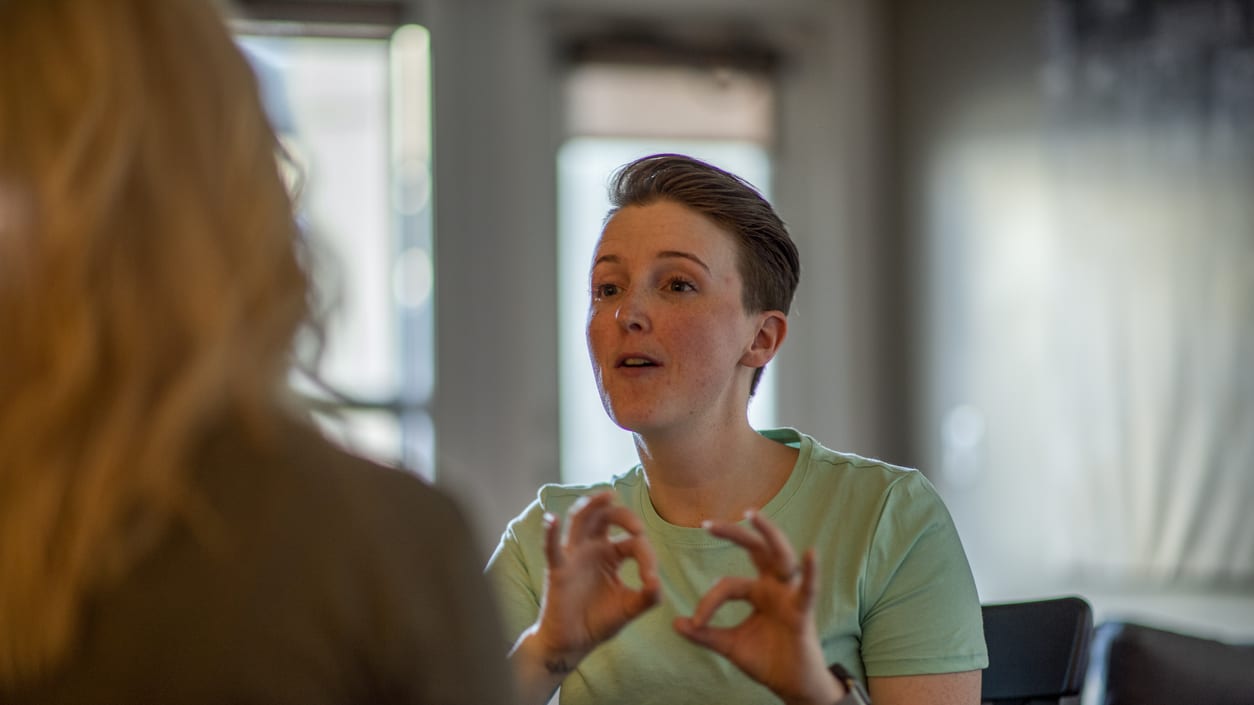Oscar Win for 'CODA' Sparks Awareness for Deaf Community
The 94th Academy Awards was a victory for DE&I

Last month's Academy Awards ceremony represented historic achievements in diversity, equity and inclusion.
Three women hosted the show. The first openly queer Afro-Latina actress won Best Supporting Actress. A Muslim actor and British Indian director took home Best Live Action Short Film. And for the first time, an all-Black production team oversaw the Oscars.
The film "CODA," which had a predominantly deaf cast, achieved an award in each category for which it was nominated: Best Actor in a Supporting Role, Best Adapted Screenplay and Best Picture. The movie tells the story of a hearing child's relationship with her deaf family.
"[The movie's wins are] definitely a success for the deaf and sign-language-awareness community," said Amy Pritchett, student success manager for language-learning marketplace Preply. "More awareness raised for the deaf community means more people worldwide will look at themselves and understand what they can do to make the world more inclusive."
Preply connects people with tutors who can teach them various languages from around the world, including sign language. The company's research showed a significant rise in demand for learning sign language after the Academy Awards.
In the 24 hours after the ceremony, Internet searches for "sign language applause" soared by 3,400 percent and "congratulations in sign language" increased by over 5,000 percent, Pritchett said.
"Positive representation of the hard of hearing in the media—like [actor] Lauren Ridloff in 'Eternals,' and [actor] Troy Kotsur on 'CODA'—has raised a lot of awareness of the daily struggles experienced by the community," she explained. "From this, we can all see how important it is to make the world a more inclusive place for the hard of hearing."
Discrimination Among Deaf Workers
"CODA" shone a spotlight on people who are deaf, including everyday struggles such as audism. This form of discrimination against hard-of-hearing people has been an ongoing issue in U.S. workplaces.
Deaf and hard-of-hearing people face audism in the form of communication barriers, discrimination or hostile attitudes, according to the Hearing, Speech & Deaf Center. Like other forms of oppression, audism prevents deaf and hard-of-hearing people from achieving their true potential.
Job applicants who are deaf or hard of hearing have long been discriminated against when seeking employment opportunities. However, this discrimination is a violation under the Americans with Disabilities Act.
[SHRM members-only resource: Attracting and Retaining Workers with Disabilities]
In 2020, the U.S. Equal Employment Opportunity Commission (EEOC) sued a Subway sandwich shop franchise in Bloomington, Ind., for rejecting a qualified, hard-of-hearing applicant for a sandwich-maker position by citing "a communication concern" due to the applicant's "hearing and speaking."
In April 2022, the EEOC sued North Memorial Health in Minnesota for violating a civil rights law when it failed to hire a deaf applicant because of her disability and failed to provide her a reasonable accommodation.
"Some employers erroneously believe that [these applicants] cannot perform the job because of their disability or discriminate against them based on myths, fears and stereotypes," Gregory Gochanour, regional attorney for the EEOC's Chicago District, said in a press release. "The EEOC will prosecute such violations of the ADA to ensure that deaf and hearing-impaired workers are not subjected to discrimination."
Howard A. Rosenblum, chief executive officer for the National Association of the Deaf, said companies can seek out, recruit and hire deaf and hard-of-hearing workers by making their application process more accessible.
"It is important to have full communication access available during the application and interview, including the provision of qualified sign language interpreters or quality captioning or other means of communication," Rosenblum said. "Companies should always ask the deaf or hard-of-hearing applicant what they require to have communication access and make arrangements to secure such services with input from the deaf or hard-of-hearing applicant."
Supporting Deaf Workers
Sian Heder, director of "CODA," learned American Sign Language (ASL) while writing the script to better communicate with the film's deaf actors. She even hired a rotating group of ASL interpreters who facilitated communication with signing and speaking among the cast and crew during filming.
However, Rosenblum suggested that many workplaces do not have leaders going to such lengths to effectively communicate with workers who are deaf.
"There are many ways to communicate, and employers should make an effort to truly communicate with their deaf and hard-of-hearing employees through their preferred means of communication," Rosenblum said. "By doing this, employers can get the best work out of their deaf and hard-of-hearing employees."
Preply shared tips for increasing inclusivity among hard-of-hearing workers:
- Add captions to video calls. This allows workers who are deaf to follow along with conversations.
- Consider hiring interpreters to assist. Having someone available to interpret conversations or presentations can help fully integrate workers who are deaf into the workplace.
- Speak directly to people without covering your mouth. This could prevent people who are deaf from reading lips.
- Don't disregard questions from deaf workers. Repeat what you said in a way that they can understand, speak clearly so they can read your lips and consider simplifying your vocabulary.
Pritchett recommended that businesses provide deaf awareness training for all employees. She also implored company leaders to learn basic sign language, which helps give deaf workers the support they need to excel and succeed in their roles.
"If a workplace is not aware of the deaf person's needs and trained in how to accommodate them, this ultimately can result in discrimination, as the employee may feel undervalued and unseen," Pritchett said. "To break down the stigma and ensure there are no barriers to communication, workplaces and whole businesses have to take steps to ensure accessibility and be inclusive."
Advertisement
An organization run by AI is not a futuristic concept. Such technology is already a part of many workplaces and will continue to shape the labor market and HR. Here's how employers and employees can successfully manage generative AI and other AI-powered systems.
Advertisement


